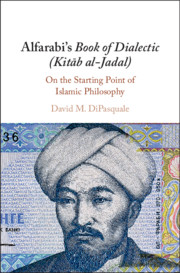Refine search
Actions for selected content:
5 results
3 - From Alfarabi’s Plato to Strauss’s Alfarabi
-
- Book:
- Leo Strauss and Islamic Political Thought
- Published online:
- 23 June 2022
- Print publication:
- 07 July 2022, pp 118-161
-
- Chapter
- Export citation
4 - Strauss, Alfarabi, and Plato’s Laws
-
- Book:
- Leo Strauss and Islamic Political Thought
- Published online:
- 23 June 2022
- Print publication:
- 07 July 2022, pp 162-204
-
- Chapter
- Export citation

Alfarabi's Book of Dialectic (Kitab al-Jadal)
- On the Starting Point of Islamic Philosophy
-
- Published online:
- 11 October 2019
- Print publication:
- 10 October 2019
Introduction
-
- Book:
- Alfarabi's <i>Book of Dialectic (Kitab al-Jadal)</i>
- Published online:
- 11 October 2019
- Print publication:
- 10 October 2019, pp 1-10
-
- Chapter
- Export citation
1 - Alfarabi’s Kitāb al-Jadal: A Complete English Translation
-
- Book:
- Alfarabi's <i>Book of Dialectic (Kitab al-Jadal)</i>
- Published online:
- 11 October 2019
- Print publication:
- 10 October 2019, pp 11-116
-
- Chapter
-
- You have access
- HTML
- Export citation
